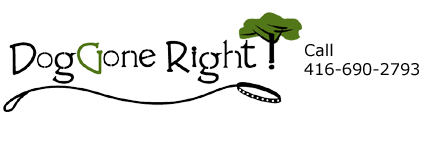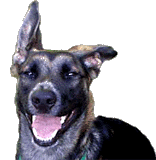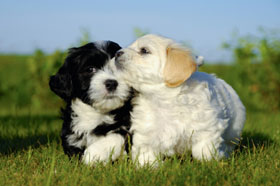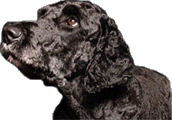Puppy Nipping and Biting
By Margaret Pender, Published: May 25, 2012
Is puppy biting normal?
Yes! Puppies bite because it is a natural, exploratory behaviour. If a puppy does not bite, you should be concerned. A puppy needs to bite in order to learn good bite inhibition.
Bite Inhibition
This term refers to how hard a puppy bites. A puppy has to be taught, initially, to bite softly or else she/he will lose your attention. Once your puppy knows that only soft bites are acceptable, teach her/him not to bite.
Bite Inhibition Exercises
You must teach your puppy not to bite. She will not outgrow it on her own. The longer your puppy continues to bite hard, the more difficult it will be to teach her not to. Puppies develop bad habits very quickly and are constantly looking to us for leadership. If you do not teach your puppy right from wrong, she/he will do what comes naturally. Biting is natural.
Practice the following exercise daily until you notice a definite change in the force of the bite: offer your hand to your puppy to chew on. When her bite is too hard for your liking, yell "OW" in a loud, deep voice. Do not pull your hand back since this will only encourage her to bite again. Wait for your puppy to back off.
Once your puppy has backed off, tell your puppy 'nice' or 'gentle' in a soft yet firm tone and offer your hand again. Her bite pressure should decrease the more you work on this exercise. Do not expect immediate results. Be consistent and persistent, but patient.
Teach your Puppy not to Bite
The first step is to teach bite inhibition (see exercise above). Once bite inhibition is good, move on to the next step and teach your puppy to mouth you only - no more biting.
To teach mouthing: start to use the same technique you used to teach your puppy not to bite hard. Instead say "OW" when your puppy puts just one tooth on your hand. Teach your puppy that teeth touching the skin result in you no longer wanting to play with her. Lips, gums and puppy's tongue are the only things that can touch your hand at this stage.
Once mouthing is well established, teach your puppy not to bite. Teach the puppy the 'off' command. Your puppy needs to be taught to respect human flesh. As soon as your puppy mouths you, say 'off' and wait for your puppy to remove her/his mouth from your hand.
At this stage, mouthing and biting are not allowed. Any mouthing or biting behaviour will result in the 'off' command being given. If not followed through, follow the advice below for attention getting behaviour.
Attention Getting Bitting
If your puppy initiates biting and she gets any type of response, even a negative one, your puppy will continue to bite/nip in order to get attention. This includes biting your feet, hands, face, clothes, shoes etc.
Teach your puppy that biting you removes the one thing she is trying to accomplish by biting you: YOU!!! As soon as your puppy starts biting, warn your puppy if she continues she will lose.
Use a command/warning such as 'cut it out', 'no biting' or something else that makes sense in the situation. Give her the command as soon as the biting starts. If your puppy does not stop, tell her 'too bad' and either leave the room or place your puppy in an isolated area. Your puppy's crate can be used, as her time out zone but be careful you don't develop a negative connotation to the crate. Try to use another area of the house like a puppy-proofed bathroom. It should not be a place filled with toys or where other people are. If she crossed the line, your puppy will be isolated for five minutes at a time.
Be consistent with your bite training. All members of the family must respond in the same manner every time the puppy starts biting. EVERY TIME!!! If you ever let a bite go unchecked, your puppy will become confused. Consistency, practice and persistence will improve the biting over time.



